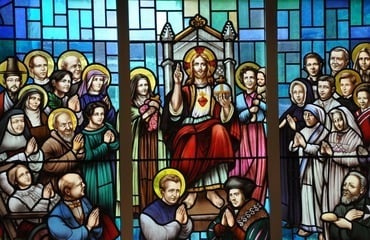-
 June 2, 2025“God’s further purpose was to reveal to all rational creatures, angelic and human, in the light of their own experience, the difference between the fruits of presumption, angelic or human, and the protection of God. For, of course, no one would dare to believe or declare that it was beyond God’s power to prevent the fall of either angel or man. But, in fact, God preferred not to use His own power, but to leave success or failure to the creature’s choice. In this way, God could show both the immense evil that flows from the creature’s pride and also the even greater good that comes from His grace.” St. Augustine of Hippo (4th-5th centuries, Doctor of the Church)
June 2, 2025“God’s further purpose was to reveal to all rational creatures, angelic and human, in the light of their own experience, the difference between the fruits of presumption, angelic or human, and the protection of God. For, of course, no one would dare to believe or declare that it was beyond God’s power to prevent the fall of either angel or man. But, in fact, God preferred not to use His own power, but to leave success or failure to the creature’s choice. In this way, God could show both the immense evil that flows from the creature’s pride and also the even greater good that comes from His grace.” St. Augustine of Hippo (4th-5th centuries, Doctor of the Church)
“God's love for His creatures was so strong that it moved Him to draw us out of Himself and give us, us, His own image and likeness – just so we might experience and enjoy Him, and share in His eternal beauty, He did not make us animals without memory or understanding, but gave us memory to hold fast His benefits, and understanding to comprehend His supreme eternal will – His will that seeks nothing else but that we be made holy. And He gave us our will to love that will of His. The will of the Word wants us to follow Him on the way of the most holy cross by enduring every pain, abuse, insult, and reproach for Christ crucified, Who is in us to strengthen us. And as soon as our understanding's eye perceives this, our will gets up at once.” St. Catherine of Siena (14th century, Doctor of the Church)
“O true Christians, help your God weep, for those compassionate tears are not only for Lazarus but for those who were not going to want to rise, even though His Majesty call them.” St. Teresa of Avila (16th century, Doctor of the Church)
“Grace is powerful – not to compel the heart, but to allure it; grace is vehement – not to outrage our liberty, but to fill it full of love; grace is intensely active – but so gently, it does not override the will; grace exerts influence – yet it does not suppress our freedom. Under the very impulse of grace, therefore, we can give our consent or offer resistance to its impulses, just as we please…How kindly God handles the human heart! How skillfully He lends His power without interfering with our freedom, so that activity of grace does not impede activity of will! He combines strength with gentleness in such a way that, when it comes to doing good, His strength gently preserves our freedom of will.” St. Francis de Sales (16th-17th centuries, Doctor of the Church)
“There is only one thing in the world that is definitely and absolutely your own, and that is your will. Health, power, possessions, and honor can all be snatched from you, but your will is irrevocably your own, even in hell. Hence, nothing really matters in life, except what you do with your will. It is that which makes the story of the two thieves crucified on either side of Our Lord, for here is the drama of wills.” Ven. Fulton Sheen (19th-20th centuries)
“God’s way with man is not dictatorship, but cooperation. If he would redeem humanity, it would be with human consent and not against it. God could destroy evil, but only at the cost of human freedom, and that would be too high a price to pay for the destruction of dictatorship on earth – to have a dictator in Heaven.” Ven. Fulton Sheen
"God having made man free will not destroy his freedom. There will be no confiscation of humanity by Divinity. If man is ever to be taken up into the Divine Order there will have to be a free act on the part of man. God comes to man not to devour him, but to consult him." Ven. Fulton Sheen
“The possibility, not the necessity, of moral evil, of wars and social injustices which follow them, is the price we have to pay for the greatest good we possess – the gift of freedom. God could, of course, at any moment stop a war, but only at a terrible cost – the destruction of human freedom.” Ven. Fulton Sheen
“It is marvelous, because, like John, all men are called to be beloved disciples. It is enough simply to become Eucharistic souls, allowing God to work within us the marvels that He alone can do! But it does require the free assent of our will. God does not like to force anyone. He wants our freely given love.” St. Carlo Acutis (20th-21st centuries)
